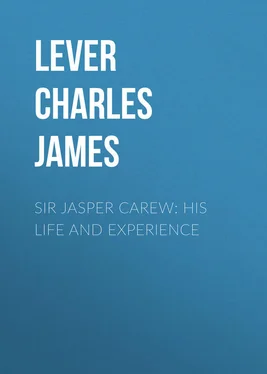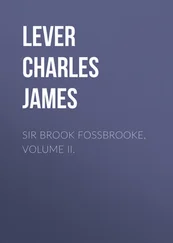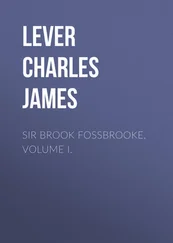Charles Lever - Sir Jasper Carew - His Life and Experience
Здесь есть возможность читать онлайн «Charles Lever - Sir Jasper Carew - His Life and Experience» — ознакомительный отрывок электронной книги совершенно бесплатно, а после прочтения отрывка купить полную версию. В некоторых случаях можно слушать аудио, скачать через торрент в формате fb2 и присутствует краткое содержание. Жанр: literature_19, foreign_antique, foreign_prose, на английском языке. Описание произведения, (предисловие) а так же отзывы посетителей доступны на портале библиотеки ЛибКат.
- Название:Sir Jasper Carew: His Life and Experience
- Автор:
- Жанр:
- Год:неизвестен
- ISBN:нет данных
- Рейтинг книги:5 / 5. Голосов: 1
-
Избранное:Добавить в избранное
- Отзывы:
-
Ваша оценка:
- 100
- 1
- 2
- 3
- 4
- 5
Sir Jasper Carew: His Life and Experience: краткое содержание, описание и аннотация
Предлагаем к чтению аннотацию, описание, краткое содержание или предисловие (зависит от того, что написал сам автор книги «Sir Jasper Carew: His Life and Experience»). Если вы не нашли необходимую информацию о книге — напишите в комментариях, мы постараемся отыскать её.
Sir Jasper Carew: His Life and Experience — читать онлайн ознакомительный отрывок
Ниже представлен текст книги, разбитый по страницам. Система сохранения места последней прочитанной страницы, позволяет с удобством читать онлайн бесплатно книгу «Sir Jasper Carew: His Life and Experience», без необходимости каждый раз заново искать на чём Вы остановились. Поставьте закладку, и сможете в любой момент перейти на страницу, на которой закончили чтение.
Интервал:
Закладка:
Had the incident occurred in our own day, the chances are that some passionate scene from Verdi, or some energetic outburst of despised love or betrayed affection from Donizetti or Meyerbeer, had been the choice, and poor Bob had gone away with a lamentable opinion of musical science, and regret for the days when “singing was preferred to screeching.” Happily the ballad was more in vogue then than the bravura, and instead of holding his ears with his hands, Bob felt them tremble with ecstasy as he listened. Enjoying thoroughly a praise so heartily accorded, my mother sung on, song after song: now some bold “romance” of chivalry, now some graceful little air of pastoral simplicity. No matter what the theme, the charm of the singer was over him, and he listened in perfect rapture! There is no saying to what pitch of enthusiasm he might have soared, had he felt the fascination of the words as he appreciated the flood of melody. As it was, so completely was he carried away by his emotions that in a rapture of admiration and delight he threw himself on his knees, and, seizing her hand, covered it with kisses.
“You’re an angel; you’re the loveliest, sweetest, and most enchanting crayture – ” He had got thus far in his rhapsody when my father entered the room, and, throwing himself into a chair, laughed till the tears ran down his cheeks.
“Bob! Bob!” cried he, “is this quite fair, I say?” And the old man, at once alive to the bantering and ridicule to which his adventure would expose him, got slowly up and resumed his seat, with a most ludicrous expression of shame on his features.
“There is no necessity of introducing one of my oldest friends to you, Josephine,” said my father. “He has already done so without my intervention, and, I must say, he seems to have lost no time in pushing the acquaintance.”
“He is quite charming,” said my mother. “We had an old Marquis de Villebois so like him, and he was the delight of our neighborhood in Provence.”
“I see what it is now,” muttered Ffrench, “you are cutting me up, between you; but I deserve it well. I was an old fool, – I am ashamed of myself.”
“Are you going away?” cried my mother.
“What is she saying?” asked he.
“She asks if you have really the heart to leave her,” rejoined my father, laughing.
“Begad, you may laugh now, Watty,” replied he, in a half-angry tone; “but I tell you what it is, you’d neither be so ready with your fun, nor so willing to play interpreter, if old Bob was the same man he was five-and-thirty years ago! – No, ma’am, he would not,” added he, addressing my mother. “But maybe, after all, it’s a greater triumph for you to turn an old head than a young one.”
He hurried away after this; and although my father followed him, and did all in his power to make him join his companions at table, it was in vain; he insisted on going to his room, probably too full of the pleasant vision he had witnessed to destroy the illusion by the noisy merriment of a drinking-party.
Trivial as the event was in itself, it was not without its consequences. Bob Ffrench had spread the fame of my mother’s beauty and accomplishments over Dublin before the following week closed, and nothing else was talked of in the society of the capital. My father, seeing that all further reserve on his part was out of the question, and being satisfied besides that my mother had acquitted herself most successfully in a case of more than ordinary difficulty, resolved on leaving the rest to fortune.
From all that I have ever heard of the society of the time, and from what has reached me by description of my mother’s manner and deportment, I am fully convinced that she was exactly the person to attain an immense popularity with all classes. The natural freshness and gayety of her character, aided by beauty and the graceful duties of a hostess, – which she seemed to fill as by an instinct, – made her the object of universal admiration, – a homage which, I believe, it was not difficult to see was even more pleasing to my father than to herself.
Castle Carew was from this time crowded with visitors, who, strangely enough, represented the most opposite sections of politics and party. My father’s absence during some of the most exciting sessions of parliamentary life had invested him with a species of neutrality that made his house an open territory for men of all shades of opinion; and he was but too glad to avail himself of the privilege to form acquaintance with the most distinguished leaders of opposite sections of the House; and here were now met the Castle officials, the chiefs of Opposition, the violent antagonists of debate, not sorry, perhaps, for even this momentary truce in the strife and conflict of a great political campaign.
CHAPTER VIII. A STATE TRUMPETER
The 27th of May, 1782, was the day on which Parliament was to assemble in Dublin, and under circumstances of more than ordinary interest. The great question of the independence of the Irish Legislature was then to be discussed and determined; and never was the national mind so profoundly excited as when that time drew near. They who have only known Ireland in a later period, when her political convulsions have degenerated into low sectarian disputes, – irregular irruptions, headed by men of inferior ability, and stimulated solely by personal considerations, – can scarcely form any idea of Dublin in the days of the Volunteers. It was not alone that the Court of the Viceroy was unusually splendid, or that the presence of the Parliament crowded the capital with all the country could boast of wealth, station, and influence, but that the pomp and parade of a powerful army added brilliancy and grandeur to a spectacle which, for the magnitude of the interests at stake, and the genius and capacity of those that controlled them, had not its superior in Europe.
The position of England at the moment was pregnant with anxiety; at war with two powerful nations, she had more than ever reason to conciliate the feelings and consult the wishes of Ireland. The modern theory of English necessity being Irish opportunity had not the same prevalence then as in our own day, but still it had some followers, not one of whom more profoundly believed the adage, or was more prepared to stake fortune on the issue, than our acquaintance, Anthony Fagan.
If the Grinder was not possessed of very sage and statesmanlike opinions on politics generally, he was, on Irish questions, fully as far advanced as the patriots of our own time; his creed of “Ireland for the Irish” comprising every article of his political belief, with this advantage over modern patriotism that he was immensely rich, and quite ready to employ his wealth in the furtherance of his conviction. He was no needy adventurer, seeking, as the price of a parliamentary display, the position to which mere professional attainments would never have raised him, but a hard-working, slow-thinking, determined man, stimulated by the ambition that is associated with great riches, and stung by the degradation of low birth and proscribed religion.
Such men are dangerous in proportion as they are single-minded. Fagan, with all his sincerity of purpose, failed in this respect, for he was passionate and resentful to an extent which made him often forget everything else but his desire of a personal reparation. This was his great fault, and, strange enough, too, he knew it. The working of that failing, and his iron efforts to control it, made up the whole character of the man.
The gross corruption which characterized a late period of Irish history was then comparatively unknown. It is very possible that had it been attempted, its success had been very inferior to that it was destined to obtain subsequently, for the whole tone of public feeling was higher and purer. Public men were both more independent in property, as well as principle, and no distinction of talent or capacity could have dispensed with the greater gifts of honesty and good faith. If there were not venality and low ambition, however, to work upon, there were other national traits no less open to the seductive arts of a crafty administration. There was a warm-hearted and generous confidence, and a gratitude that actually accepted a pledge, and acknowledged it for performance. These were weaknesses not likely to escape the shrewd perception of party, and to the utmost were they profited by. The great game of the government was to sow, if not dissension, at least distrust, in the ranks of the national party, – to chill the ardor of patriotism, and, wherever possible, to excite different views, and different roads to success, amongst the popular leaders of the time. There came a day when corruption only asked to see a man’s rent-roll and the list of his mortgages, when his price could be estimated as easily as an actuary can calculate an annuity when given the age and the circumstances of the individual. Then, however, the investigation demanded nicer and more delicate treatment, for the question was the more subtle one of the mixed and often discordant motives of the human heart.
Читать дальшеИнтервал:
Закладка:
Похожие книги на «Sir Jasper Carew: His Life and Experience»
Представляем Вашему вниманию похожие книги на «Sir Jasper Carew: His Life and Experience» списком для выбора. Мы отобрали схожую по названию и смыслу литературу в надежде предоставить читателям больше вариантов отыскать новые, интересные, ещё непрочитанные произведения.
Обсуждение, отзывы о книге «Sir Jasper Carew: His Life and Experience» и просто собственные мнения читателей. Оставьте ваши комментарии, напишите, что Вы думаете о произведении, его смысле или главных героях. Укажите что конкретно понравилось, а что нет, и почему Вы так считаете.











